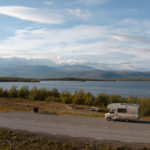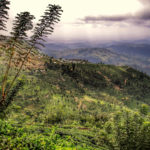
Hama Sankare is a renowned composer, arranger, vocalist, and calabash player from Mali whose reputation grew rapidly working with Ali Farka Touré as well as le Troupe Regionale de Niafunké, l’Orchestre de Gao, Songhoy Allstars, and Mamadou Kelly. Now he returns with his second release, Niafunke, which sees him enlist the help of his longtime friends and collaborators Afel Bocoum, Yoro Cissé, and Kande Sissoko. They continue to explore the traditions of Niafunké, just as they did with Ali Farka Touré, along with Oumar Konaté, Dramane Touré, Makan Camara, Alibaba Traoré, and Sékou Toure.
The album opens with the propulsive “Dewel Wegé,” an uplifting song encouraging men and women to carry pride and confidence in themselves. The ensemble, rich with group vocals, guitars, bass, drumkit, and calabash settle quickly into an infectious tune that sets the stage for the rest of the record. Konaté’s guitar work is energetic and sympathetic at the same time and serves as an additional voice in the group.
“Remobe” keeps up the pace and really shows the depth of Sankare’s vocals and leadership. He sings from the heart about the important role agriculture plays in development. Konaté weaves tight, funky wah-wah riffs on his guitar as the band supports Sankare.
The violence and suffering found in Mali today is the focus of “Tiega Mali,” an evocative piece that digs into a blues with the addition of the ngoni. Sankare and Konaté create a spacey atmosphere with their voice and guitar respectively. It is easy to feel the heartache in this composition.
The acoustic “Nojarro” strips back the sound to hear Sankare at his fullest, praising the hunters who are noble to his people. His refined voice is one with the acoustic guitar, ngoni, monochord, and calabash. “Foulbé” speaks to all of Mali’s citizens in a call for peace. The repeated backing vocals provide a foundation for Sankare to let his voice play with the rhythm. Konaté interjects fine harmonic phrases in his fluid style.
“Alkaleyka” comes at the mid point of the record and marks a fine group performance. The song praises Boubou Ardo Galo, a hero to the Peuhl people. The mix is terrific, each instrument clear and blending beautifully with the group vocals. Camara adds a bit of kick to the piece on his drumkit, pushing the groove along.
Sankare laments the lack of decent work on “Yer Kure Ti Afo,” a slow blues that simmers with expressive electric guitar from Konaté. “Baba Gomni” is a primarily acoustic praise song that honors the man who has done so much for the community of Niafunké. Here the ngoni and monochord blend with the acoustic guitar perfectly. Afel Bocoum offers a nice section of spoken word with the band cooking in the background.
“Solane” is a sweet piece that addresses the need for patience and tolerance in today’s world with some nice bass playing from Dramane Touré. The record concludes with “Cherie,” a positive song about cherishing and respecting women and children. It also warns against believing false stories with Sankare’s solo vocal closing the track.
Niafunke, recorded at Studio Bogolan in Bamako, brings together traditional and contemporary Malian music to produce a fine album with lots of soul. Sankare balances acoustic and electric compositions well and the clear recording helps the listener hear the intricate details. Sankare is not just preserving this music, he is passionately bringing it to the next generation.
Originally published in RootsWorld Magazine.




Be First to Comment